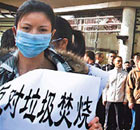Society
Xinjiang courts handle rising security cases
By Cui Jia (China Daily)
Updated: 2010-01-16 07:51
 |
Large Medium Small |
URUMQI: Courts across Northwest China's Xinjiang Uygur autonomous region handled a total of 437 cases of endangering State security last year, compared with 268 such cases in 2008, the regional court chief has announced.
"More than 250 people were sentenced to 10 years in prison or more for offenses related to endangering State security," Rozi Ismail, president of the Higher People's Court of Xinjiang, said in his annual work report during a plenary session of the Xinjiang People's Congress on Thursday.
According to Chinese law, activities endangering State security include: joining an espionage organization or accepting a mission assigned by an espionage organization or by its agent; stealing, secretly gathering, buying or unlawfully providing secrets; or committing any other sabotage that endangers national security.
"Striking hard against terrorism, separatism and extremism, which the government believes was the cause of the deadly riot, is the foundation of Xinjiang's economic development," he said.
Xinjiang's GDP increased by 8 percent last year, 1 percent less than its target due to the drop in tourism income because of the July 5 riot and the impact of the financial crisis, regional government chairman Nur Bekri said in his annual work report delivered on Tuesday.
Ismail also said anyone engaged in activities that endanger State security, including murder, bombing, poisoning and arson, will face severe penalties and harsh punishment.
About 3,000 people in the region received sentences ranging from five years in prison to death sentences last year for criminal offences, according to the higher court's work report.
The regional government plans to increase its spending on public security by almost 90 percent this year compared to last year to further maintain social stability following last year's July 5 riot.
The regional government's spending on public security will reach nearly 2.9 billion yuan ($423 million) this year, up 87 percent over last year's 1.5 billion yuan.
The government also plans to implement measures to cut the communication between overseas terrorists, separatists and extremists with their counterparts in Xinjiang.
"After the July 5 riot, we recognized that the communication network, such as the Internet, has become an important tool for terrorists, separatists and extremists to instigate violence in the region. The government will crack down on such activities this year," said Eligen Imibakhi, chairman of the standing committee of the Xinjiang People's Congress.
(China Daily 01/16/2010 page4)













